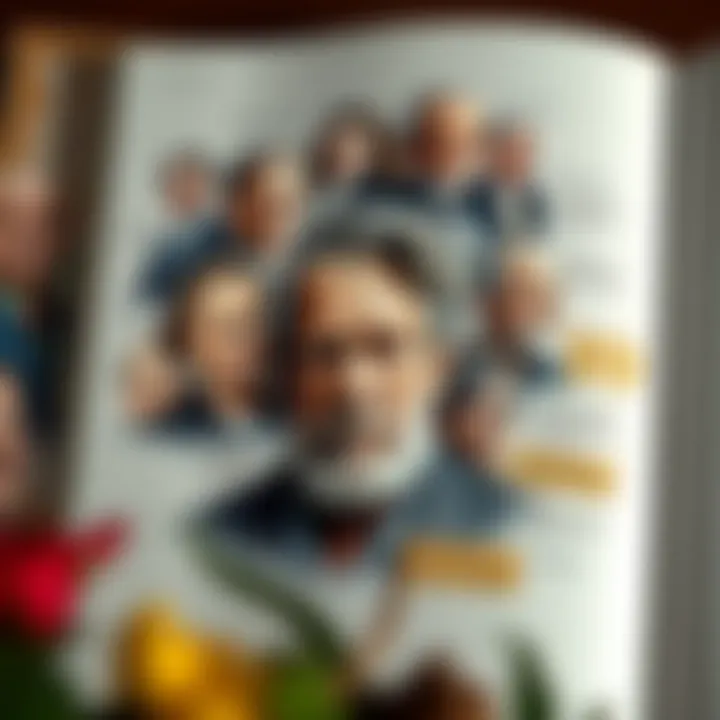The Influence of Quotes on Personal Growth


Intro
In a world teeming with information, sometimes all it takes is a short, sharp phrase to provoke thought and inspire growth. Inspiring quotes, whether scrawled in notebooks or shared on social media, possess a remarkable potency. They resonate with core feelings and struggles, connecting deeply with individuals navigating their paths in personal development.
These words from prominent thinkers or practitioners often serve as touchstones in our journeys. They encapsulate wisdom honed through experience and present it in a digestible format. So why do certain statements strike a chord? It’s about the timelessness of their messages, the authenticity behind them, and the clarity they provide, enabling us to see our circumstances from a different angle.
Understanding the origin and significance of these quotes sheds light on how they can be practically applied in the hustle and bustle of daily life. Let’s dive into the key lessons and insights that these powerful phrases can offer, providing pathways for reflection and transformation.
Key Lessons from Inspiring Quotes
Lesson Overview
In the exploration of how quotes impact personal development, certain lessons stand out. For example, consider the quote by Mahatma Gandhi: "Be the change that you wish to see in the world." This statement does more than just inspire—it challenges individuals to take personal responsibility, urging them to initiate the change they desire rather than waiting for it to happen. Such insights can be life-altering when internalized.
Moreover, each quote encapsulates a specific lesson that can be analyzed and put into practice:
- Self-Reflection: Quotes prompt individuals to introspect and evaluate their current beliefs and behaviors.
- Motivation: They stir up emotions, reenforcing one’s resolve to continue striving despite obstacles.
- Simplicity: The succinct nature of quotes makes complex ideas more accessible and easier to remember.
Practical Applications
Turning these lessons into actionable steps is where the true power of quotes shines:
- Journaling: Start a daily journaling practice using a quote as a prompt. Reflect on how it relates to your current life and any actions you can take.
- Goal Setting: Choose a quote that resonates with your aspirations. Keep it visible in your workspace or on your phone to remind you of your objectives.
- Discussion Groups: Engage with others by discussing the implications of various quotes. This can lead to deeper understanding and diverse perspectives that enrich personal growth.
- Visual Reminders: Design posters with quotes that resonate with you. Place them where you see them often—such as your bathroom mirror or refrigerator door—as daily motivation.
"Quotes are like shortcuts for the mind, encapsulating lessons in a way that lingers long after the words are spoken."
As we navigate through the various layers of personal growth, these insights from quotes can guide us toward more profound realizations and actionable change.
Prolusion to the Significance of Quotes
In our fast-paced and often chaotic world, quotes have emerged as powerful tools for inspiration and reflection. They offer snippets of wisdom that can resonate deeply with our personal experiences and aspirations. As we journey through life, quotes can serve as guiding stars, illuminating the paths we wish to tread. By harnessing the power of language, individuals can articulate emotions and thoughts that often remain unspoken. In this article, we will delve into the significance of quotes, examining how they encapsulate profound insights and spur personal growth.
One might wonder, why do these carefully constructed strings of words hold such sway over human thought? The answer lies in their ability to distill complex ideas into digestible formats. Quotes can challenge norms, provoke thought, and inspire action—all in a matter of seconds. Their brevity allows for quick consumption, making them accessible to anyone seeking motivation or clarity.
Moreover, quotes possess an emotional weight that resonates differently with each person. For some, they spark an epiphany about a lingering issue; for others, they might ignite a sense of hope on a dreary day. This unique personal connection underscores the significance of quotes as transcendent messages that can bridge generations. Throughout history, notable figures from various realms—be it literature, science, or politics—have used quotes to express their philosophies and experiences, leaving an indelible mark on society.
The Role of Language in Expressing Inspiration
Language serves as a vessel for conveying thoughts and emotions that, at times, seem too complex for raw dialogue. Quotes often employ metaphors, allusions, and other figures of speech to intensify their impact. Take, for example, Martin Luther King Jr.'s famous line: "Injustice anywhere is a threat to justice everywhere." This statement not only speaks to civil rights but embodies a broader ethos of interconnectivity and empathy among humanity.
The beauty of language lies in its ability to evoke feelings. Often, a simple phrase can transcend cultural and linguistic boundaries. Whether in English, Spanish, or Mandarin, the core sentiment remains the same—encouragement, hope, and resilience. Additionally, quotes make it convenient for individuals to express solidarity with others, fostering connections that can transcend personal circumstances.
Brief History of Quotes in Literature
Quotes have a long and rich history that traces back to the roots of written expression. Ancient philosophers like Socrates and Aristotle used concise statements to articulate profound wisdom, paving the way for modern discourse. In literature, memorable quotes have served as cornerstones for themes that still resonate today. Shakespeare, with his meditations on love, betrayal, and the human condition, provided the world with lines that linger in our collective consciousness.
As the ages have progressed, quotes have maintained their relevance in various forms. From Franklin D. Roosevelt’s inspiring speeches during the Great Depression to contemporary authors sharing their insights on social media, the craft of distilling experience into quotations remains intact.
As we navigate through this article, we will continue to explore how quotes shape personal development and the overarching narrative of human experience. From sparking motivation to fostering understanding, their impact is both profound and enduring.
Understanding the Power of Quotes
Quotes hold a unique place in our journey toward personal growth and development. They are snippets of wisdom, often encapsulated in just a few words, that can profoundly influence our emotions, thoughts, and actions. In the fast-paced, often chaotic modern world, quotes serve as a steady compass pointing towards introspection and improvement.
How Quotes Resonate with Individuals
Quotes have an almost mystical ability to connect with our innermost feelings. They can mirror our experiences, ignite our aspirations, or soothe our doubts. This resonance often hinges on shared values, sentiments, or cultural contexts. As people navigate through their lives, a well-timed quote can feel like it was penned just for them. What makes this connection so powerful?


First and foremost, the brevity of quotes allows them to penetrate deep into our psyche. They can be easily remembered, repeated, and reflected upon. When an individual encounters a quote like, "The journey of a thousand miles begins with a single step," it may trigger a realization about procrastination or fear of taking risks. The magic lies in the way these words can prompt self-reflection and motivate personal action.
Moreover, quotes can also act as a catalyst for connection, often fostering a sense of unity among individuals who share similar challenges or triumphs. They can provide motivation in times of despair and encouragement in moments of uncertainty. Whether it’s a tweet, a post on Facebook, or a simple note on the fridge, quotes can instill courage and inspire people to chase their dreams.
The Psychological Impact of Inspirational Quotes
The impact of quotes extends into the realm of psychology. Their potential to motivate and encourage individuals is well-documented. Not only can they serve as quick sources of inspiration, but they can also encourage cognitive shifts that lead to profound personal transformations.
Motivation and Encouragement
An essential characteristic of inspirational quotes is their dual nature: they motivate and encourage change. For many, reading particular quotes can serve as a turning point—like a light bulb flicking on in a dark room. They hold the power to elevate one's mood and instill enthusiasm for the challenges ahead. For instance, the quote, "Believe you can and you're halfway there," speaks volumes about the role of self-belief in achieving goals. Its straightforwardness makes it a popular choice in personal development circles.
However, one must consider that motivation driven solely by quotes can sometimes lead to superficial understanding. A single phrase can’t substitute the deep commitment required for lasting change. Nevertheless, it provides a starting point, encouraging deeper exploration of one's aspirations and long-term strategies for success.
The Role of Cognition in Interpretation
The interpretation of quotes is deeply rooted in individual cognition. Each person brings their unique life experiences, beliefs, and emotional states to the table when processing these succinct messages. The unique feature of cognition lies in the way it shapes the understanding and significance of quotes.
For example, a quote about resilience might inspire one person who is facing a difficult period while leaving another feeling indifferent if they are currently in a state of contentment. This variability underscores an essential point: the utility of quotes is contingent upon one’s personal context and mindset at any given moment. Thus, while a quote might incite a powerful response in one individual, it may not resonate with another for various reasons.
"You must be the change you wish to see in the world." - Mahatma Gandhi
This quote embodies the essence of taking responsibility for one's personal growth, encouraging individuals to look inward and enact change, making it a perfect illustration of the overarching power that quotes hold in shaping personal narratives.
For further reading on the effects of inspirational quotes, consider resources like Wikipedia or articles on psychology's role in personal development.
Quotes are more than just words—they're a reflection of the thoughts and beliefs that shape our actions, steering us toward our desired pathways.
Examining Notable Inspirational Quotes
Exploring notable inspirational quotes serves as a powerful lens through which we can observe personal development. These snippets of wisdom often encapsulate deep truths and perspectives that can resonate with diverse audiences. Their importance lies not only in their succinctness but also in their ability to evoke critical introspection, fostering a deeper understanding of oneself and the world. In this section, we will delve into various aspects of notable quotes, their philosophical origins, and how different disciplines contribute their unique insights.
Philosophical Reflections
Philosophical reflections on quotes reveal a rich tapestry of thoughts that probe the nature of existence and the human condition. These reflections often challenge our preconceived notions and encourage us to contemplate ethical dilemmas and the complexities of life. Furthermore, they instigate a dialog about purpose and motivation. For instance, when contemplating Friedrich Nietzsche’s assertion that "He who has a why to live can bear almost any how," individuals can partake in a profound inquiry about their own motives and how these shape their resilience in difficult times. Including such philosophical elements not only enriches the discussion but also helps to anchor personal growth in a broader intellectual context.
Quotes from Thought Leaders in Various Fields
In this section, we break down quotes from various disciplines that highlight the multifaceted nature of inspiration.
Literature
Literary quotes carry a distinctive characteristic of emotional depth. They often weave complex narratives about human experiences, resonating with readers on multiple levels. Writers such as Maya Angelou poignantly state, "I can be changed by what happens to me. But I refuse to be reduced by it." This unique feature of literature, in its ability to evoke empathy and relatability, positions it as a beneficial avenue for personal introspection. The inherent richness found in literary quotes often invites diverse interpretations and aids individuals in grappling with their own challenges and triumphs.
Science
Scientific quotes often highlight the pragmatic approach to intellectual exploration and human endeavor. For instance, Albert Einstein wisely noted, "Insanity is doing the same thing over and over again and expecting different results." This insight serves to encourage critical thinking about one's actions and their consequences. The clarity and precision typical in scientific discourse empower individuals to seek logically sound solutions to personal obstacles. Choosing science as a foundation for inspirational quotes contributes a solid basis upon which one can build effective strategies for improvement.
Business
In the realm of business, quotes often reflect a mindset of growth and resilience. Legendary figures such as Steve Jobs have stated, "Your work is going to fill a large part of your life, and the only way to be truly satisfied is to do what you believe is great work." The key characteristic of business-related quotes is their focus on action and achievement. Such insights can lead individuals to reassess their professional journeys and inspire them toward new ventures, yet they also carry the risk of fostering a relentless chase for success which can lead to feelings of inadequacy if not balanced appropriately.
Politics
Political quotes evoke a sense of authenticity and accountability. Quote like John F. Kennedy's "Ask not what your country can do for you—ask what you can do for your country" emphasizes civic responsibility. This characteristic of calling upon individual action can be both empowering and intimidating. While inspirational, the impact of political quotes often hinges on the values they cultivate within society, shaping public discourse and individual actions. However, the challenge lies in the interpretation and potential manipulation of such quotes to fit various political agendas.
"Not all those who wander are lost." – J.R.R. Tolkien
By examining quotes across these diverse fields, we grasp a clearer understanding of personal development. They illuminate paths for reflection, strategy, and civic engagement, each playing an essential role in the personal growth narratives of individuals today. Leveraging these insights helps in harnessing inspiration in multi-layered ways, urging individuals to act and evolve continuously.


While each discipline brings its own flavor, the unifying thread of inspiration connects them, offering a wealth of wisdom that transcends traditional boundaries.
Application of Quotes in Daily Life
Using quotes in day-to-day life has a profound impact on how we perceive our circumstances and make decisions. These simple collections of words can serve as powerful reminders, helping to foster inspiration and resilience in various situations. When people encounter challenges, an apt quotation can offer solace, clarity, or even a nudge in the right direction. Moreover, incorporating quotes into our daily dialogue or internal narrative encourages a culture of reflection and intention. By paying attention to the wisdom of others, individuals can navigate their own journeys with a more informed perspective.
Inspiring Action and Decision-Making
Inspirational quotes often serve as catalysts for action. When faced with tough choices, a well-placed quote can crystallize the importance of making a decision and taking that leap of faith. For instance, the saying "The journey of a thousand miles begins with a single step" can motivate one to tackle daunting tasks by breaking them down into manageable actions.
Furthermore, drawing from quotes allows individuals to align their actions with their values. Here are a few reasons how quotes can inspire action:
- Clarity: A succinct quote can bring clarity to complex problems, steering individuals toward conscious decision making.
- Empowerment: Quotes often encapsulate feelings of strength and determination that can empower one to push through doubts.
- Community Connection: Sharing a favorite quote can create bonds with like-minded individuals, forming a support network that values personal growth and action.
In everyday situations, those who have a collection of inspirational quotes may pull them out when needed, reminding themselves and others that taking action, no matter how small, is essential for progress.
Enhancing Personal Growth through Reflection
Quotes are not just mere phrases; they can act as mirrors reflecting our innermost thoughts and beliefs. Engaging with a quote on a personal level can initiate profound reflection about one’s life. For example, when someone grapples with the quote, "Life is either a daring adventure or nothing at all," it can inspire deep questioning about his or her life choices. Are they living courageously? Are they seeking out adventures?
This reflection can fuel personal growth in several ways:
- Introspection: Quotes prompt introspection, which can lead to valuable insights about one's desires and motivations.
- Goal Setting: By contemplating a thought-provoking quote, individuals can set clearer goals that resonate with their aspirations.
- Resilience Building: Reflecting on overcoming struggles through the lens of a quote can enhance emotional resilience, allowing for better coping mechanisms in the face of future challenges.
Through regular engagement with inspiring quotes, individuals may find their mindset evolving over time, facilitating a deeper understanding of their journey and an enhanced capacity for growth.
The Influence of Quotes on Emotional Well-being
The role of quotes in shaping our emotional landscape cannot be overstated. Quotes often act as mirrors, reflecting our innermost thoughts and feelings, guiding us through the tumultuous waters of life. They have a unique way of embedding themselves into our psyche, offering comfort, wisdom, and insight when we need it most. In this section, we will explore how inspiring quotes bolster emotional well-being by offering strength in adversity and fostering self-affirmation.
Strengthening Resilience
Resilience is the ability to bounce back from life's challenges, and quotes can be a pivotal part of nurturing this trait. When faced with difficulties, turning to quotes can be akin to finding an anchor in a storm. For instance, a simple yet powerful phrase like "This too shall pass" often serves as a reminder that hardships are temporary, enabling individuals to endure and ultimately overcome.
Key Benefits of Quotes on Resilience:
- Perspective Shift: Quotes can reframe our understanding of situations, allowing us to see challenges in a new light.
- Emotional Comfort: They provide a sense of companionship as if someone else has traveled the path before us and understands our plight.
- Cognitive Anchors: Repeating uplifting quotes can shift mental focus and promote mental clarity, fostering an environment where resilience can flourish.
Every time we recite an impactful quote, there is a small, yet significant shift in our emotional state. The act of internalizing such wisdom often lights a fire of motivation, encouraging individuals to tackle obstacles rather than shy away from them.
Quotes as Forms of Self-Affirmation
The practice of self-affirmation is vital for bolstering one's self-esteem and overall emotional health. Through the lens of quotes, this practice can take on an even deeper meaning. By repeating affirming statements, individuals can cultivate a more positive self-image. For instance, when one chants to themselves, "I am enough," it serves not only to uplift but also to embed that truth deeply within.
Examples of Self-Affirming Quotes:
- *"I am capable of achieving my goals."
- "My value is inherent; I do not need external validation."
- "Each day is a new opportunity for growth and learning."*
These proclamations work to create a mental environment rich in positivity and self-acceptance.
The right quote at the right moment can cultivate an inner dialogue that nurtures self-worth and dispels negativity, leading to a healthier emotional state.
Challenges in Interpreting Quotes
Interpreting quotes presents a fascinating yet intricate aspect of understanding their power and influence in personal development. Recognizing the nuances behind an expressive statement requires more than a mere glance; it demands an awareness of language and context. The essential challenge lies in the different meanings a quote may carry for distinct individuals depending on their own experiences, beliefs, and cultural backgrounds. If one is not careful, the beauty of a quote can be diminished by misunderstandings or oversimplifications.
"Language is the dress of thought." – Samuel Johnson


Quotes have the potential to articulate complex ideas succinctly. However, when these profound thoughts are stripped from their context, their intended impact may evaporate. Each quote is like a pearl, often surrounded by a shell of metaphor and eloquence. The listener or reader must peel away these layers to grasp the rich essence hidden within.
Ambiguities in Language and Meaning
Language inherently possesses a certain level of ambiguity, making it both a powerful and tricky tool for communication. The words chosen to convey a message can provoke varied interpretations. A quote, often crafted with deliberate brevity, can serve as a double-edged sword. For instance, take the famous quote by Ralph Waldo Emerson, "To be yourself in a world that is constantly trying to make you something else is the greatest accomplishment." This nugget of wisdom champions individuality but could also lead individuals down a rabbit hole of self-doubt if misinterpreted.
Ambiguity opens doors to multiple readings, which is both an advantage and a pitfall. When someone reads a quote, what resonates may hinge on their current mindset or situational context. The word "self" could mean different things in different facets of life – personal, professional, or familial. A reader may misinterpret advice meant for overcoming societal pressures as a blanket dismissal of the need for growth or change. Recognizing this potential for misunderstanding is essential for meaningful engagement with inspiring quotes.
Cultural Context and Reception
The influence of culture on how quotes are received and interpreted cannot be understated. Each society carries its unique set of values, beliefs, and experiences that can drastically shape the understanding of a quote's meaning. For example, a quote about perseverance may be construed as merely inspirational in one culture, while in another, it may delve deep into the connotations of struggle and sacrifice.
Consider the oft-cited phrase, "The early bird catches the worm." In some cultures, this may instill a value of hard work and initiative, while other cultures may focus on a balance between work and relaxation, viewing this mentality as overly aggressive or unhealthy. Thus, reliance on a single interpretation without acknowledging cultural nuances can lead to either a misrepresentation of the quote or a disconnect from the intended audience.
In this increasingly connected world, quotes circulate across borders and cultures like wildfire, sometimes losing their essence in translation. Therefore, grasping the cultural backdrop of a quote is crucial. One must appreciate how historical events, societal changes, and local customs can enrich or alter its significance.
In summary, while quotes are remarkable tools for personal development, they come with their share of challenges. Ambiguities in language and the cultural reception of quotes present hurdles that require thoughtful consideration. Engaging deeply with these powerful statements can yield profound insights and motivation, but only if one navigates these complexities with care.
Contemporary Usage of Inspiring Quotes
In our fast-paced, often chaotic world, the need for inspiration and wisdom has never been more critical. People are on the hunt for phrases that resonate deeply, guiding them through personal trials and triumphs. The contemporary usage of inspiring quotes serves not just as decorative phrases splattered across coffee mugs and home decor, but as powerful tools for personal development. These brief snippets of insight can ignite a spark in individuals, encouraging introspection and fueling motivation in everyday life.
A quote can serve as a lifebuoy when one feels adrift in the sea of life's challenges. It's about connecting with something greater than oneself, tapping into the collective wisdom of those who have walked various paths before us. Today, with the ubiquity of social media, such quotes find their way into millions of feeds, providing a common language of inspiration that transcends geographical boundaries.
The Role of Social Media in Dissemination
Social media’s role in the dissemination of quotes cannot be overstated. Platforms like Instagram, Twitter, and Facebook have transformed how inspirational messages are shared and embraced. A simple tweet or post can reach thousands in mere seconds, allowing insight from a thought leader or a common person to spread like wildfire. These quotes often come paired with images or graphics, enhancing their impact and shareability.
- Accessibility: Anyone can access a wealth of knowledge at their fingertips, scrolling through feeds that bombard them with wisdom.
- Visual Appeal: Graphics and art accompanying quotes make them visually interesting, capturing a user's attention much faster than standard text.
- Memorable Snippets: Social media breaks down complex ideas into digestible doses, ensuring that personal development concepts remain within reach and memorable for users.
However, amidst this cacophony of quotes, it’s vital to sift through what resonates personally. The challenge lies in finding authenticity among the noise. Often, one can encounter a quote that feels like a shot of adrenaline in a moment of doubt, propelling them towards actions that may shift their course.
Creating Communities through Shared Wisdom
Inspiring quotes not only have the power to motivate individuals but also to forge communities around shared experiences and beliefs. This sense of belonging can emerge when quotes resonate with the collective struggles or achievements of a group. For example, a quote about resilience in the face of adversity can inspire a discussion in a support group, fostering deeper connections among participants.
- Common Purpose: Communities often rally behind the notions presented in quotes, uniting individuals with a common purpose or experience.
- Support and Growth: In these settings, quotes can act as conversation starters, leading to deeper discussions about personal challenges and triumphs.
- Empowerment Through Sharing: When individuals share their favorite quotes, they contribute to a growing pool of wisdom, making the practice personal yet communal.
As people reflect on quotes that resonate with their feelings and experiences, they can connect with others, cultivating supportive networks that further their personal development journeys. It serves as a reminder that even in the solitude of personal growth, one is never truly alone; we walk this path together, equipped with the wisdom of those who inspire us to keep moving.
"You are never too old to set another goal or to dream a new dream." – C.S. Lewis
The contemporary usage of quotes reveals their profound impact on individuals and communities alike, demonstrating how they can foster understanding, promote personal change, and inspire action across varying contexts.
Culmination: The Lasting Legacy of Inspiring Quotes
In the realm of personal development, inspiring quotes are much more than mere phrases; they serve as powerful anchors in the turbulent sea of life experiences. The value of quotes lies in their ability to condense complex life lessons into succinct, memorable ideas. This makes them accessible to anyone, whether they are students wrestling with academic uncertainties, educators seeking motivation, or entrepreneurs navigating the bristling world of business.
Reflecting on personal journeys is key to understanding the profound impact quotes can have. They often emerge at pivotal moments, providing a gentle nudge towards introspection or a firm push towards taking action. When faced with difficulties, one might stumble upon a quote like Maya Angelou’s, "You may not control all the events that happen to you, but you can control your attitude toward them.” This simple yet impactful statement can alter one's perspective, transforming setbacks into opportunities for growth.
Reflection on Personal Journey
Personal development is a journey fraught with self-discovery and challenge. Quotes have a unique way of crystallizing feelings and experiences that one might struggle to articulate. They can evoke memories, reignite old ambitions, or even foster a sense of community among like-minded individuals who draw inspiration from the same sources. Reflecting on one's own path alongside these potent words can illuminate the winding roads and unforeseen detours taken over time.
For many, revisiting a favorite quote can serve as a reminder of core values or goals. This reflective practice can lead to deeper insights. People may recall why they were inspired by a particular phrase or how it helped them overcome specific hurdles. This introspective process amplifies the significance of quotes—turning them into powerful tools not just for motivation, but for fostering a more nuanced understanding of their personal development journeys.
Encouragement to Seek and Share Wisdom
Encouraging others to seek and share wisdom is a fundamental aspect of harnessing the greatest potential from inspiring quotes. Wisdom does not exist in a vacuum; it flourishes through dialogue and exchange. When individuals express their insights or recount how a particular quote influenced their journey, they spark communal insights and reflections. This sharing nurtures a collective reservoir of knowledge that benefits all involved.
Participating in discussions, whether in physical or digital communities, allows for diverse interpretations of quotes and their meanings. Platforms like Reddit often serve as spaces where users dissect quotes, offering fresh perspectives that might not have been considered before. This collaborative approach promotes an environment rich with thoughts and understandings that can illuminate new pathways in personal growth.
As you explore the profound legacy of inspiring quotes, consider how your personal experiences align with these nuggets of wisdom. Embrace the journey by not only reflecting on your past but also by sharing newfound insights with others. Doing so generates a ripple effect—fostering growth in not just yourself, but in the wider community of seekers and learners.
"The greatest gift you can give yourself is a little bit of your own attention." – Anthony J. D'Angelo



